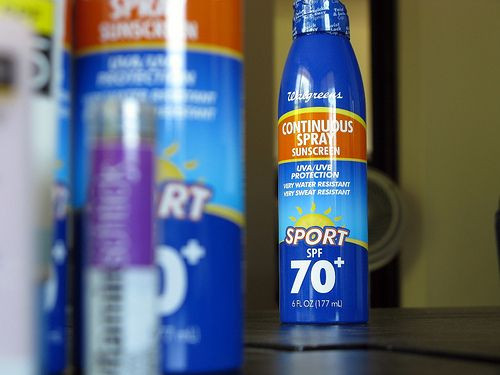Is Sunscreen The New Fountain Of Youth? May Prevent Signs Of Aging By 24%

While the Centers for Disease Control and Prevention implores the daily use of sunscreen to prevent skin cancer and melanoma, researchers have found yet another use for the product. Studies have found that when used consistently, sunscreen can prevent aging of the skin.
With many anti-aging creams and serums exceeding the $100 mark these days, a simple and affordable measure like sunscreen could prove useful for many Americans.
Sunscreen prevents photo aging of the skin by forming a physical barrier of chemicals that reflect the sun's harmful rays away from the face. As a result, little light can penetrate the sunscreen barrier into the layers of facial skin beneath.
The sun's rays are very harmful to the skin, often causing serious ailments like skin cancer or melanoma. In 2009, 61,464 Americans were diagnosed with melanoma, many of whom could have been saved by regular application of sunscreen while outdoors.
In a four-year study,1621 randomly selected Australian adults from the ages of 25 to 55 were given daily sunscreen and B-carotene supplement regimens to follow; control groups applied sunscreen at their discretion and took B-carotene placebos. β-carotene is a vitamin and antioxidant that normally works to keep the organs, including the skin, functioning as if they were young, and becomes deficient as people age. Its absence is found to encourage aging, especially of the skin.
At the start of the study, each person was given a skin aging grade from 1-6, with 6 showing the most signs of aging. The measured signs of aging, which are also most aggravated by sun exposure, were reduced elasticity of the skin, epidermal thickening, dryness, and abnormal growth formation of skin at the surface.
The study found that the β-carotene made little difference in the amount of aging that occurred. However, the group applying sunscreen daily had many participants remain at their original skin aging grade over the duration of the four-year study. This indicates sunscreen's anti-aging properties, as those with discretionary sunscreen use had more signs of aging after the four years had passed.
For example, among the people using sunscreen daily, only six people moved from a grade of 3 (good, few signs of aging) to 6 (bad, many signs of aging). Conversely, among the people using discretionary sunscreen, 16 people had the same grade change. However, many more individuals who were not using sunscreen suffered signs of aging, making it clear that sunscreen is helping to fight off these signs and occurrences on the skin.
The researchers also found the frequency of sunscreen application played a part: 77 percent of the daily sunscreen users applied it three or four days per week compared to the discretionary users, of which only 33 percent applied this often.
β-carotene supplements has no overall effect on skin aging, but depending on the severity of one's baseline skin-aging appearance, the supplements may help to slow the process. Among people in both discretionary and daily sunscreen groups, the ones taking β-carotene maintained their skin grade or the grade above it over the four-year study. This is notable because the few taking the placebo achieved such a small amount of aging. For example, people originally graded a 3 never reached the grade of 5 or 6 while taking the β-carotene. Similarly, 62 percent graded with a 4 stayed at that grade or went up to 5, and again, never reached 6.
However, there is still aging while using β-carotene and little to no aging while using sunscreen.
The researchers concluded that sunscreen ought to be used as a preventative measure among the young and middle-aged to prevent the signs of aging. The study has found that skin aging is reduced by 24 percent when one uses sunscreen often. And β-carotene supplements may not always slow down the sun's aging affects, but some results proved its ability to maintain skin condition, so its use should not be ruled out completely.
So forget the expensive creams and cosmetics - sunscreen works just as well for preventing aging.
Source: Hughes MCB, Williams GM, Baker P, et al. Sunscreen and Prevention of skin Aging: A Randomized Trial. Annals of Internal Medicine. 2013.
Published by Medicaldaily.com



























